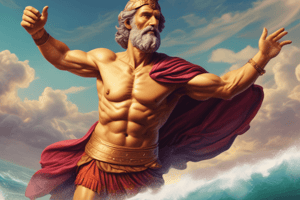Podcast
Questions and Answers
What does Apollo plague the Greek camp with?
What does Apollo plague the Greek camp with?
- Disease (correct)
- Flood
- Famine
- Darkness
Who stops Achilles from killing Agamemnon?
Who stops Achilles from killing Agamemnon?
Athena
What does Zeus tell Agamemnon in his dream?
What does Zeus tell Agamemnon in his dream?
To go fight the Trojans
Paris is afraid to fight Menelaus.
Paris is afraid to fight Menelaus.
Hector is Paris' ______.
Hector is Paris' ______.
Why does Athena find Pandarus?
Why does Athena find Pandarus?
How does Diomedes perform in battle?
How does Diomedes perform in battle?
Aeneas gets killed by Diomedes.
Aeneas gets killed by Diomedes.
Hector's mother is named ______.
Hector's mother is named ______.
What does Hector ask the women of Troy to do?
What does Hector ask the women of Troy to do?
Flashcards are hidden until you start studying
Study Notes
Chapter 1
- Achilles and Agamemnon quarrel, leading to tension in the Greek camp.
- Apollo plagues the Greeks, wanting his priest Chryses to retrieve his daughter, Chryseis.
- Agamemnon returns Chryseis but demands Achilles' captive, Bryseis.
- Achilles, enraged, nearly kills Agamemnon but is restrained by Athena.
- Achilles' mother, Thetis, seeks Zeus' help to punish the Greeks.
- Hera, upset by Zeus’ potential favoritism towards the Trojans, overhears their conversation.
Chapter 2
- Zeus sends Agamemnon a dream to mobilize against the Trojans.
- Agamemnon tests troop morale, nearly causing them to abandon the siege.
- Odysseus regains control, and Thersites is reprimanded for insulting Agamemnon.
- Odysseus and Nestor argue for continued combat.
- The "Catalogue of the Ships" lists Greek leaders and their contributions.
- Iris informs the Trojans of the impending Greek attack.
Chapter 3
- Paris, a Trojan prince, fears facing Menelaus, whose wife Helen he took.
- Hector criticizes Paris for his cowardice; they propose a duel to end the war.
- Helen is invited to watch the duel, revealing her anxiousness about Paris' fate.
- Priam, King of Troy, asks Helen about the Greeks before the battle begins.
- Paris is nearly defeated but is saved by Aphrodite, who intervenes in the fight.
- Helen berates Paris for his retreat, and the Greeks mistakenly believe they've won.
Chapter 4
- Discussion in Olympus reveals Zeus' wish to end the war, countered by Hera and Athena's desire for bloodshed.
- Athena persuades Pandarus to shoot Menelaus, reigniting hostilities.
- Menelaus sustains only a minor wound, prompting Agamemnon to reassure him.
- Machaon, a healer, treats Menelaus' injury as the Greeks prepare for renewed battle.
Chapter 5
- Diomedes is empowered by Athena to lead a fierce counteroffensive against the Trojans.
- Pandarus' attacks result in slight injuries, further escalating his fury.
- Aeneas argues with Pandarus about abandoning his bow, leading them into battle.
- Diomedes kills Pandarus and gravely wounds Aeneas, who is saved by Aphrodite.
- Diomedes becomes defiant against divine intervention, having already injured Aphrodite.
- Apollo heals Aeneas, but the Trojans press the attack, gaining the upper hand until Athena and Hera rally the Greeks.
Chapter 6
- A counterattack by the Greeks is led after Hector is advised to seek prayers from Trojan women.
- Emotional scenes unfold as Hector comforts his mother, Hecuba, inside the city.
- Diomedes forms a friendship with Glaucus, highlighting warrior bonds over enmity.
- The atmosphere in Troy intensifies as women inquire about their husbands' fates amidst the ongoing war.
Studying That Suits You
Use AI to generate personalized quizzes and flashcards to suit your learning preferences.




